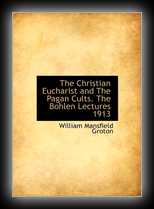
The Christian Eucharist and the Pagan Cults
by William Mansfield Groton
1913
John Bohlen, who died in this city on the twenty-sixth day of A pril, 1874, bequeathed to trustees a fund of one hundred thousand dollars, to be distributed to religious and charitable objects in accordance with the well-known wishes of the testator. By a deed of trust, executed June 2, 1875, the trustees under the will of Mr. Bohlen transferred and paid over toT heR ector, Church Wardens, and Vestrymen of the Church of the Holy Trinity, Philadelphia, in trust, a sum of money for certain designated purposes, out of which fund the sum of ten thousand dollars was set apart for the endowment ofT he John Bohlen Lectureship, upon the following terms and conditions: The money shall be invested in good substantial and safe securities, and held in trust for a fimd to be called The John Bohlen Lectureship, and the income shall be applied annually to the payment of a qualified person, whether clergyman or layman, for the deU very and publication of at least one hundred copies of two or more lecture sermons. These Lectures shall be deU vered at such time and place, in the city of Philadelphia, as the persons nominated to appoint the lecturer shall from time to time determine, giving at least six months notice to the person appointed to deliver the same, when the same may conveniently be done, and in no case selecting the same person as lecturer a second time within a period of five years.
(Typographical errors above are due to OCR software and don't occur in the book.)
1914 Excerpt: ... sources, so the Church in her development could with equal right accept ideas and suggestions from the earnest pagan life around her. For the Holy Spirit in His guidance of the developing Church would be likely to deal with her as He had dealt with the progressing Revelation of the Scriptures.1 But before we assume this position 1 Mr. George Coore says in the Hibbert Journal, vol. xi, p. 343, "by all means let it be shown that as a rite it has its historical and anthropological precedents and affinities; because when God speaks to man we may expect that he will speak a language already familiar. The 'teste David cum Sybilla' is an old maxim of Catholicism, and the Catholic of Grseco-Latin tradition should be the last to contemn the Hellenic elements in his religion." The Catholic Encyclopaedia, while it affirms that there is no connection between the pagan and fundamentally repugnant to Catholic and Protestant alike, it would be wise for us to consider whether the evidence at our disposal necessitates the act. Already several theories, explanatory of the rise of the Lord's Supper, as celebrated and understood by the Church, are in the field. The majority, if not all of them, are based on the supposition that the Lord's Supper became a sacrament only at some moment in the early history of the Church. The traditional belief that Jesus Christ reclined with his disciples at a farewell meal is generally accepted. The real problem is whether he intended this meal to be a sacrament and subject to repetition, or whether the meal assumed this character only in the course of time and under external influences.1 The Church herself has the Christian eucharists, nevertheless says, "what we particularly discover is a new proof of the reasonableness of the...
